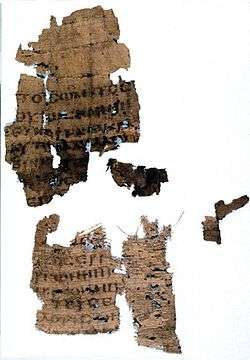James 2
| James 2 | |
|---|---|
|
Epistle of James 2:19-3:9 on the verso side of Papyrus 20, from the 3rd century. | |
| Book | Epistle of James |
| Bible part | New Testament |
| Order in the Bible part | 20 |
| Category | General epistles |
James 2 is the second chapter of the Epistle of James in the New Testament of the Christian Bible.[1][2] The author identifies himself as "James, a servant of God and of the Lord Jesus Christ" and the epistle is traditionally attributed to James the brother of Jesus.[3][4]
Text
- The original text is written in Koine Greek.[5]
- Some of the oldest manuscripts containing this chapter are:[6]
- Papyrus 20 (3rd century)
- Codex Vaticanus (AD 325-350)
- Codex Sinaiticus (AD 330-360)
- Papyrus 6 (AD 350; in Coptic language)
- Codex Alexandrinus (ca. AD 400-440)
- Codex Ephraemi Rescriptus (ca. AD 450)
- Papyrus 54 (5th century; extant: verses 16-18, 22-26)
- This chapter is divided into 26 verses.

Structure
This chapter can be grouped (with cross references to other parts of the Bible):
- James 2:1-13 = Beware of Personal Favoritism
- James 2:14-26 = Faith Without Works Is Dead
Verse 1
- My brethren, do not hold the faith of our Lord Jesus Christ, the Lord of glory, with partiality.[7]
Verse 8
- If you really fulfill the royal law according to the Scripture, “You shall love your neighbor as yourself,” you do well; [8]
Contains citation from Leviticus 19:18
Verse 11
- For He who said, “Do not commit adultery,” also said, “Do not murder.” Now if you do not commit adultery, but you do murder, you have become a transgressor of the law. [9]
Contains citation from Exodus 20:13-14; Deuteronomy 5:17-18
Verse 17
- Thus also faith by itself, if it does not have works, is dead.[10]
It is like a lifeless carcass, a body without a soul, ( James 2:26 ) for as works, without faith, are dead works, so faith, without works, is a dead faith, and not like the lively hope and faith of regenerated persons: and indeed, such who have no other faith than this are dead in trespasses and sins; not that works are the life of faith, or that the life of faith lies in, and flows from works; but, as Dr. Ames observes F2, good works are second acts, necessarily flowing from the life of faith; to which may be added, and by these faith appears to be living, lively and active, or such who perform them appear to be true and living believers.[11]
Verse 23
- And the Scripture was fulfilled which says, “Abraham believed God, and it was accounted to him for righteousness.”[g] And he was called the friend of God.[12]
Contains citation from Genesis 15:6
Verse 25
- Likewise, was not Rahab the harlot also justified by works when she received the messengers and sent them out another way?[13]
Contains reference to Joshua 2:15-16
See also
- Abraham
- Faith
- Jesus Christ
- Rahab
- Ten Commandments
- Other related Bible parts: Genesis 15, Exodus 20, Leviticus 19, Deuteronomy 5, Joshua 2, 1 Samuel 16, Galatians 5
References
- ↑ Halley, Henry H. Halley's Bible Handbook: an abbreviated Bible commentary. 23rd edition. Zondervan Publishing House. 1962.
- ↑ Holman Illustrated Bible Handbook. Holman Bible Publishers, Nashville, Tennessee. 2012.
- ↑ Davids, Peter H (1982). I Howard Marshall and W Ward Gasque, ed. New International Greek Testament Commentary: The Epistle of James (Repr. ed.). Grand Rapids, Mich.: Eerdmans. ISBN 0802823882.
- ↑ Evans, Craig A (2005). Craig A Evans, ed. Bible Knowledge Background Commentary: John, Hebrews-Revelation. Colorado Springs, Colo.: Victor. ISBN 0781442281.
- ↑ 20. James: Introduction, Outline, and Argument. Bible.org
- ↑ The New Testament Virtual Manuscript Room, Institute for New Testament Textual Research (INTF), Münster.
- ↑ James 2:1
- ↑ James 2:8
- ↑ James 2:11
- ↑ James 2:17
- ↑ John Gill's Exposition of the Entire Bible - James 2:17
- ↑ James 2:23
- ↑ James 2:25
![]() This article incorporates text from a work in the public domain: Gill, John. Exposition of the Entire Bible (1746-1763).
This article incorporates text from a work in the public domain: Gill, John. Exposition of the Entire Bible (1746-1763).
.jpeg)